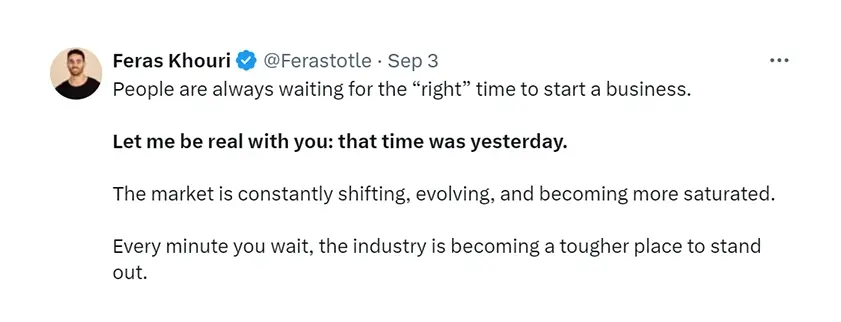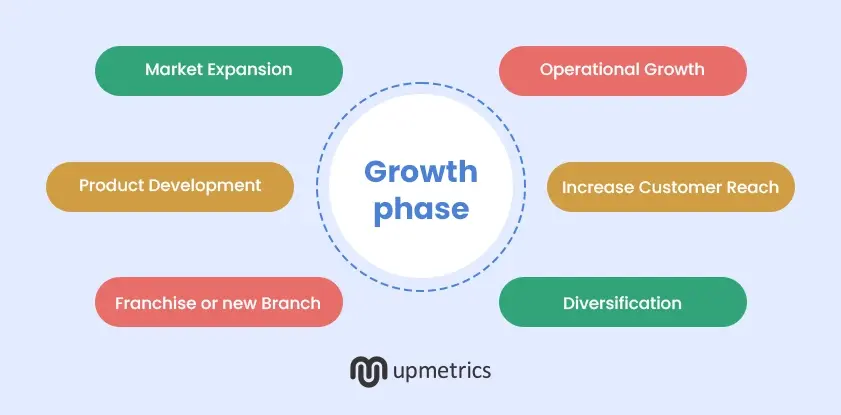While most entrepreneurs recognize the importance of having a business plan and are willing to invest their time in writing one, they struggle with one common question: When is the best time to write a business plan?
Is it before a launch or after a launch? Is it while they chase the investors or when the business starts facing challenges?
Well, this blog post has all the answers for you. Here we’ll help you figure out the right time to write a business plan so that you always have it handy when needed.
Let’s get started.
Key Takeaways
- The optimal time to write a business plan is before launching your business, but it’s beneficial at any stage.
- Regular updates to the business plan ensure it reflects current goals, market conditions, and operational strategies.
- A well-timed business plan helps in strategic planning and securing necessary resources.
When is the best time to write a business plan?
A business can benefit from a business plan in all its phases—launch, growth, or exit. Having a well-crafted plan helps you make more thorough and informed decisions about your business.
Realistically, there’s no right or ideal time to write a business plan. Any time when your business can benefit from direction and focus is a good time to get started.
However, each stage of your business demands a different approach to planning. Understanding and altering your plan accordingly can help you reap the most benefits.
Well, we have created this list of different business phases where you must write a business plan:
1. The ideation phase
The journey between a business idea and turning it into a successful business is a long one. Validating your idea can be the first step on this long journey.
A business plan at this stage helps organize your jumbled thoughts and distill clarity about important business aspects. It helps identify the gaps in your business idea and compels you to address the major issues before investing time or money into your idea.
A quick one-page business plan distilling clarity about your goals, target market, competitors, revenue streams, and finances is enough for the ideation phase.
It will help you find answers to important questions such as:
- Can this business idea turn profitable?
- Is there a market for what you want to sell?
- How much money will you need to launch this business?
Now, don’t spend longer than necessary perfecting your business plan at this stage. Nitpicking every detail just yet would delay your entry into the market space, and that’s quite unnecessary.
This tweet by Feras Khouri, the co-founder, and CEO of the 8-figure brand Manssion encapsulates our idea perfectly.

When to start writing: Immediately after you come up with your business idea.
2. The launch phase
Once you have a viable business idea that can turn into a profitable business venture, you take the obvious step of launching your business.
At this stage, you need a detailed plan outlining your business model, its strategy, and financials with utmost clarity.
Now, this plan will serve as a strategic roadmap for your business. So invest a good amount of time detailing every aspect of your business model.
Writing a business plan at this stage will help you:
- Enhance your market adaptiveness
- Understand your target audience and their needs
- Develop a better product-market fit
- Create your unique competitive edge
- Streamline your business operations
- Maintain an optimum cash flow
- Align your team with the business vision
Besides, a business plan will help ensure that your business activities align with the achievement of your ultimate goal.
A business plan isn’t supposed to be your holy grail. But referring to it will definitely assist you in making a successful launch.
When to start writing: 3-6 months before launch.
3. The growth phase

A business plan is a crucial document that will support you while growing your business.
Whether you’re venturing into a new market, growing your team, or increasing your production—a business plan will help you grow strategically without exhausting your cash reserves.
Business planning during the growth stage aligns your strategies with the growth objectives. It ensures that you have everything you need to grow your business.
A well-crafted growth plan with detailed financials gives you enough perspective on a particular growth initiative. It demonstrates the impact of each decision, helping you make informed decisions.
Additionally, a business plan serves as an excellent communication tool, aligning your team to the ultimate business vision.
When to start writing: 1-2 months before initiating growth efforts.
4. The funding phase
A business plan is non-negotiable when you’re planning to secure funds for your business.
Be it investors, banks, or even grants—most financial institutions would demand a well-detailed business plan before choosing to fund your business.
That’s because a business plan demonstrates that you have undertaken essential research to present a viable funding demand and have a thorough funding plan to utilize those funds judiciously.
Additionally, a business plan at this stage will help you find answers to important questions related to the market and financials. Questions you wouldn’t be able to answer if you haven’t written a business plan.
Some of these questions include:
- What will be the return on investment (ROI) in your business?
- When will the business turn profitable?
- What is the Customer Acquisition Cost (CAC) of your business?
- What is the size of your current market?
- What is your competitive advantage?
- How scalable is your business model?
- What are the key metrics for your business?
A business plan will not only help you answer these questions; it will show the investors that you have undertaken essential planning to turn your business successful.
When to start writing: 1-2 months before seeking funding.
5. The contingency phase
Businesses should have a contingency plan in action for different scenarios. For instance, supply chain disruptions, vendor disagreement, environmental or regulatory changes, and changes in consumer preferences.
A contingency plan demonstrates how your market and finances would change under different scenarios. It helps evaluate the impact and prepare for the losses by creating different strategic directions that your business may take.
When you have such a plan handy, you can make swift changes to your approach and redirect your financial resources optimally.
Let’s understand this with a fictional example:
FreshBloom Organics is an organic skincare brand that sources lavender from local farmers to produce its bestselling lavender body butter. Let’s say that due to severe weather conditions, their local lavender supplier faces crop failure.
Thankfully, FreshBloom has a contingency plan that can help it navigate this situation without causing significant business losses.
- Alternative Suppliers: FreshBloom pre-negotiated with two backup suppliers who can deliver lavender within a week.
- Product Substitution: They launch a seasonal chamomile body butter as a temporary alternative.
- Communication: They notify customers about the delay and offer pre-orders for lavender products when they become available.
A contingency plan doesn’t have to be detailed. Just a simple list of strategic changes will help you make quick changes when an actual emergency arises.
When to start writing: As soon as the business starts operating.
6. The exit phase
A business plan demonstrates the financial and operational efficiency of a business, essential when you’re planning to get acquired or maybe even launch an initial public offering (IPO).
Writing a business plan at this stage gives you a proper overview of your assets, debts, capital efficiency, and business performance. This will guide you to make a calculated assessment of your valuation and help you realize its full value.
Additionally, an exit plan can be a valuable tool in impressing the acquiring firm. A well-detailed, comprehensive plan offers them enough insight into how the business operates, helping them make an informed choice.
When to start writing: 2-4 months before exiting.
That said, these were different scenarios or business phases when you would require a business plan. But this brings us to the question: Do you always need to write a detailed business plan?
Let’s find out.
Situations where you might not need a formal business plan
Now, most entrepreneurs push back the process of writing a business plan because they consider it to be time-consuming and taxing. Well, unless you’re writing a formal business plan, this isn’t quite true.
In most business phases and scenarios, you wouldn’t need a detailed formal plan. Just a simple one-page plan that clearly distills your ideas and strategies is enough.
Some of these situations include:
- When you want to validate a business idea, a quick one-page plan or a business model canvas is enough.
- A simple list-down approach works better for communicating business objectives internally.
- Seasonal and temporary businesses like pop-up shops need a lean planning approach as opposed to long-term strategic planning.
- Businesses in rapidly changing industries benefit from agile planning that enables them to test, learn, and pivot without committing to long-term, rigid strategies.
- Established ongoing businesses benefit from short plans to evaluate a new strategy or change in operations.
Unless you’re required to submit your business plans to external parties like stakeholders and investors, a formal plan isn’t quite necessary.
Instead of procrastinating, adopt a planning approach that suits your business and write a suitable plan.
How long should you spend writing a business plan
The short answer—anywhere from a day to a few months.
The long answer? It depends on the stage of your business and the type of plan you’re writing.
Let’s simplify it further.
Depending on the type of plan
Formal business plans that detail every aspect of your business in great depth take a long time to prepare. Typically, 2-6 months for complex business models. However, AI and business planning tools can help you get a first draft of your business plan in less than a week.
Lean plans, on the other hand, can be crafted in a couple of hours or a few days at most. These plans document the key aspects of your business without diving into unnecessary details.
Depending on the business stage
Ideally, you shouldn’t be spending more than 1-2 days on a business plan that’s supposed to help with idea validation.
However, once you have a validated idea, spend a couple of weeks understanding the target market, competition, and your finances. A thorough business plan at this stage will help you establish the foundation.
Writing a business plan for the launch phase shouldn’t take longer than 1-4 weeks.
Business plans, at the later stages, focus more on operational and financial growth. These are informal documents that won’t take long to write. However, depending on the type of strategic change a business is trying to implement, planning can take a couple of weeks.
Summarizing, don’t spend longer than a month or two writing your business plan.
In this rapidly changing business dynamic, the plan will probably change before the ink is dry. If you spend too much time delving into details, the strategies will turn irrelevant by the time you take action.
Why the best time to write a business plan is now
Not tomorrow, not a week from now, not a month later—the best time to write a business plan is today.
It doesn’t matter what stage of business you’re at. Writing a business plan is a valuable process that will force you to organize your thoughts, strategies, and finances for your business.
The more you delay the process, the more your business risks losing focus and missing key opportunities. With a business plan, you get direction, a roadmap, and clarity to operate your business successfully.
Now, there’s no need to spend 6 months crafting a business plan with extensive forecasts and strategies when you haven’t even started.
The idea is to start with a one-page plan and then build it into a concrete plan as the business starts taking shape.
With the Upmetrics business planning software, you can build a business plan in no time. Its guided approach, extensive library of business plan samples, AI functionalities, and financial forecasting assistance simplify business planning to the core.


